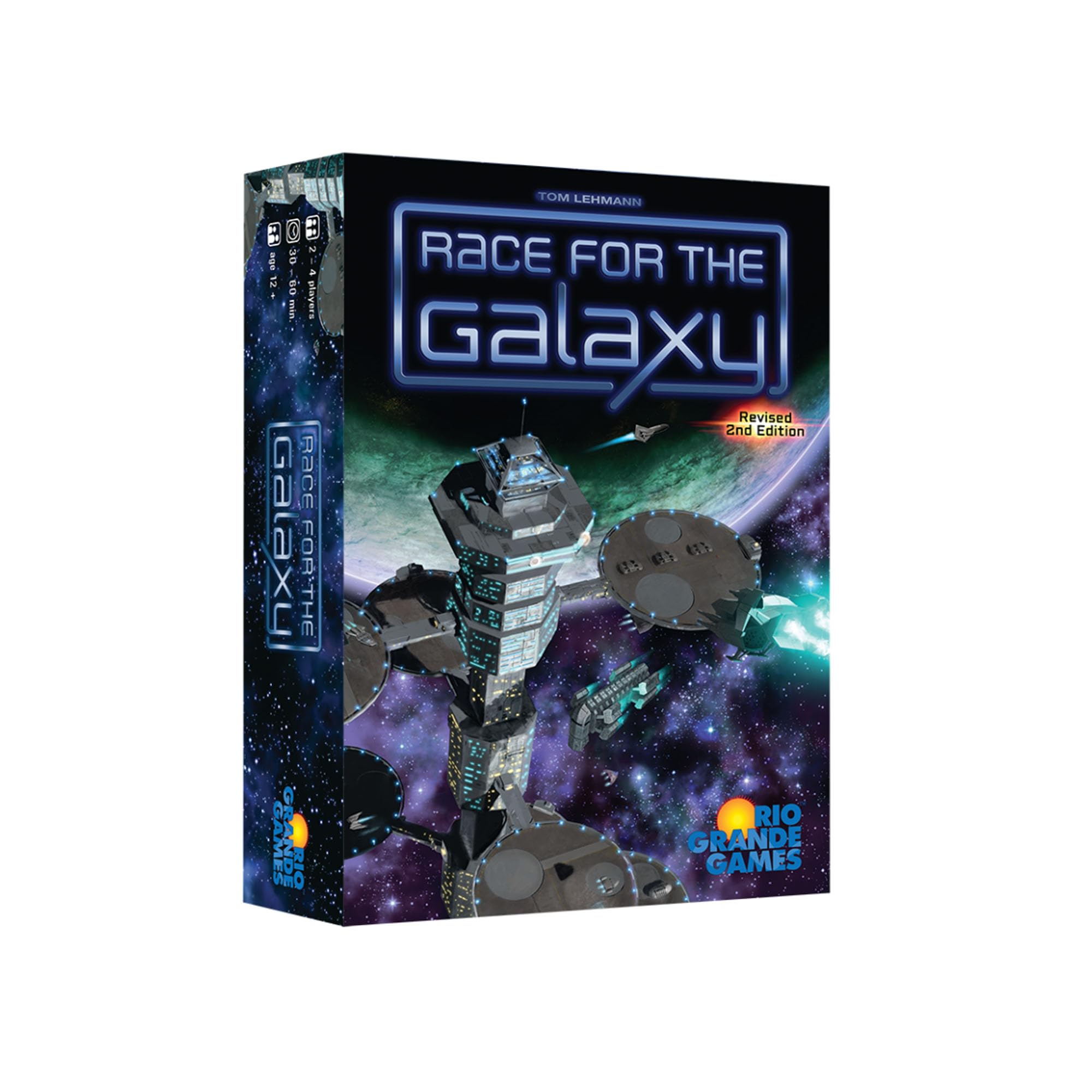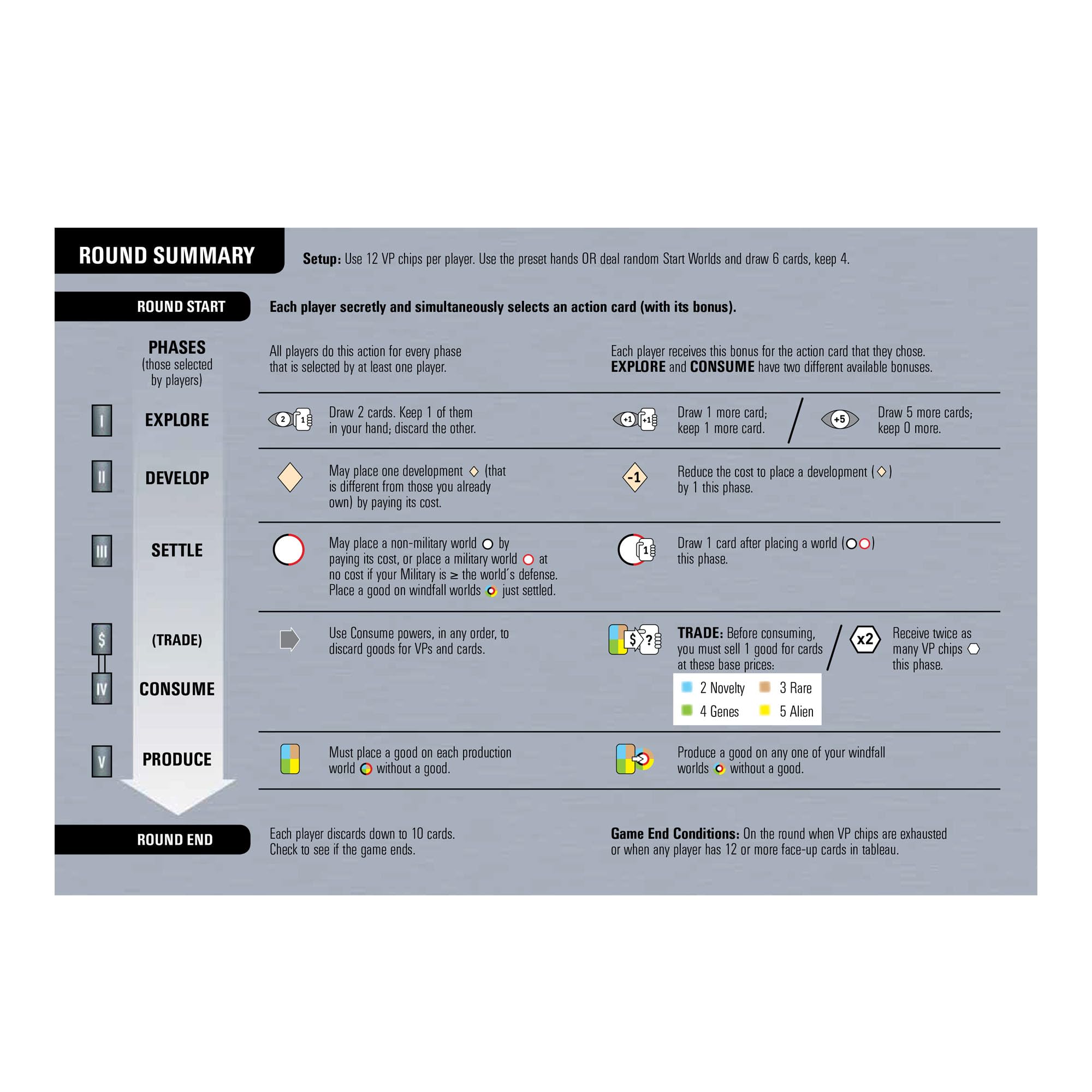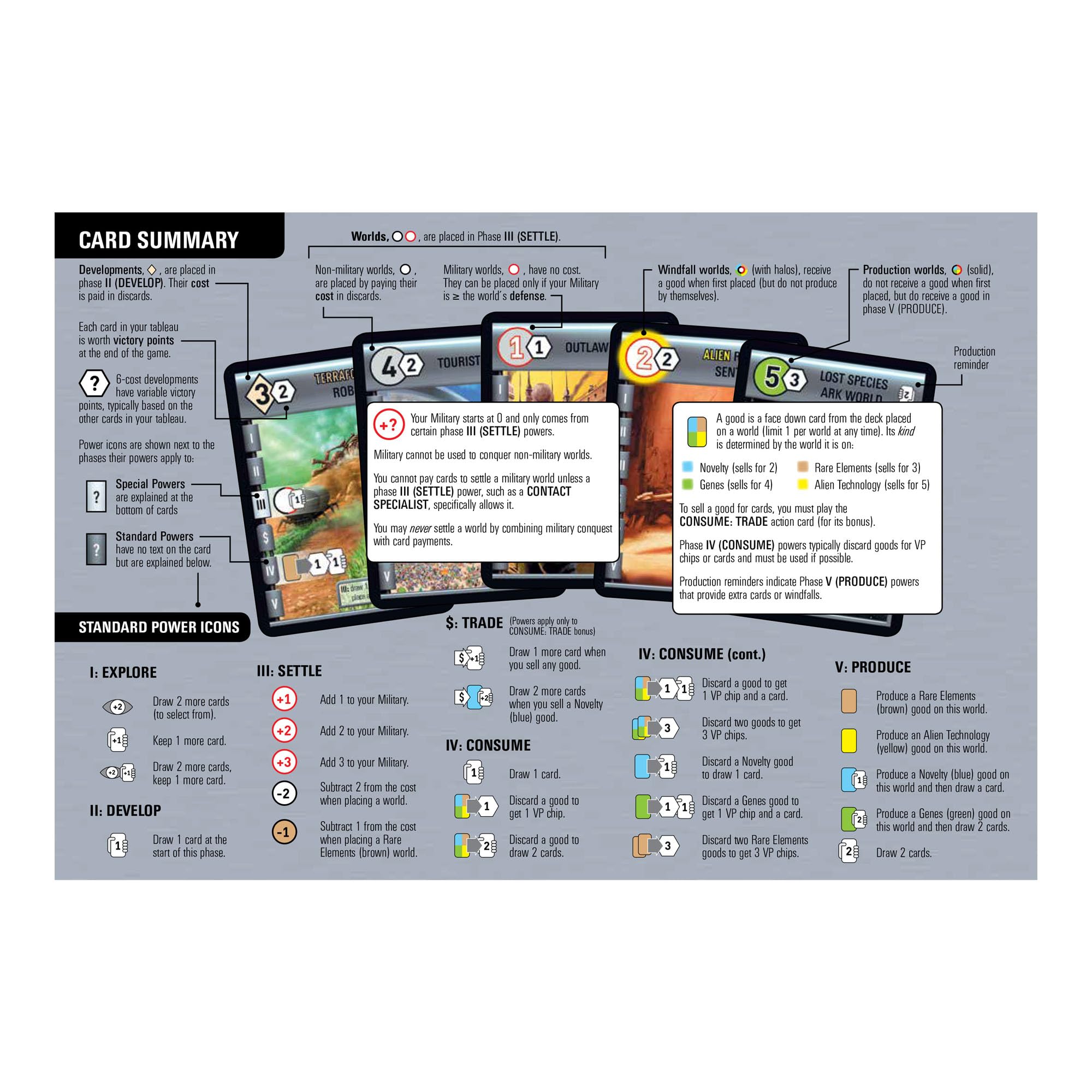




🚀 Race to Victory in the Galaxy!
Race for the Galaxy is a strategic card game designed for 2-4 players aged 12 and up, where players build their own galactic civilizations, score points, and compete for supremacy. With various expansions available, the game offers a rich and engaging experience that keeps players coming back for more.
C**T
Initially a steep learning curve, but worth learning ~
I feel that the fact that this game is less popular than, say, Dominion is that there is a much tougher learning curve to get started. Despite the lack of information in some areas of the instructions (and the fact that they say to use the pre-numbered cards for your first game but don't give you an idea of how to play out your first game with the numbered cards), there are some very good online tutorials.There are over 100 cards. There are also several expansions available, but this review applies to the base game only. The cards have interesting, though not always high quality, science fiction art. I especially enjoy Plague World. But the art and titles of the cards are nice and keep the player engaged.Game play is fluid, which is nice. Some folks say this is a version of 2 - 4 player solitaire, but I disagree. I think part of the key to winning is in guessing what phases your opponents will take and also in trying to speed up or slow down the time when the game ends. I'll give a brief overview:Each player randomly selects one of five start worlds. Each of these worlds have a different bonus or attribute. Each player then 'explores' or by selecting six cards and keeping four. Each player then selects one of seven action cards and places them face down. When all players have done so they then flip the cards over and the round begins with the actions proceeding in numerical order. The actions are 'explore' which allows players to draw more cards, 'develop' which allows players to place a development card, 'settle' which allows players to place a planet card, 'consume' which allows players to use goods in exchange for cards or victory points, and 'produce' which allows players to produce goods on planets that can produce.If a player places an action card, all players perform the action with only those that placed that action card acquiring the bonuses associated with the card. So if two players placed develop and one placed produce, all three would be allowed to place a development card, but only the two who used the action can get the -1 development cost bonus. Then all players would produce (each action can only go once per round), and only the player that played the produce action would be allowed the bonus of placing a good on a windfall world.I won't get into too much detail, but the game ends when a player places 12 cards into his tableau (the cards in front of him/her on the table) or if all victory points are used (you start with a pot of 12 per player). The winner is determined by adding victory point chips to the victory point values of the cards in their tableau, and any bonuses that may be applicable. Play continues through the final action of that round (so even if a player places his 12th card in the settle phase, you would still continue play through the last action someone played of that round).Sounds a bit complicated? Well it is at first. Understanding the basic nature of the game isn't too tough, but it's the bonuses on the cards that get complicated. Luckily the rules have 3 or 4 pages dedicated to the explanations of the bonus symbols. And the bonuses on the cards are listed under the phases they apply to. So if somebody uses a settle action, you would look at your cards in your tableau and see if you get any bonuses for III (settle) and use them if applicable.One of the fun things to do is to use actions which will not benefit other players, but benefit yourself. If other players have only a couple of cards in their hand, but you have a lot, then you might settle or develop (since you pay the cost by discarding the number of cards from your hand associated with the cost). Other players may be unable to pay the cost to deploy these cards, thereby rendering the action useless for them. Then you might still get to use actions that they select (such as explore or produce). Another trick is to use produce when others have goods already out and you don't. Though they might use a consume action which would use some or all of their goods (which is the action that always occurs before produce!). Or you could look and see that another player is likely to use produce, so you can use consume as your action, knowing that you would get the bonus, then you would basically be able to produce goods the next action without any cost to you.Part of the strategy involves planning your method of attack early. Sometimes you will have a card that is amazing, but it takes awhile to get it into play. Other times you can start with a good level of military and then spend your time acquiring stronger military by using military development cards and then settling (conquering) military worlds for victory points instead of producing and consuming goods. Other times you might score an amazing production bonus development card (such as the card that allows you to acquire 3 VPs in exchange for consuming a good of each of three different colors (can be doubled with the consume 2x VP action) - my favorite card in other words). The variety is endless.The game is also great for 2 players. There is an additional and optional style of play for two people that is worth trying once players are familiar and it involves two extra action cards (9 total) and each player placing two actions per round.I haven't tried the expansions yet, but I will surely be picking them up soon. This game skyrocketed ahead of some others in my collection. Still, Carcassonne: 10 Year Special Edition is a great game for those not really into Euro games with a steep learning curve; Samurai is a favorite of many friends who aren't avid game players (and an easy game to set up and play quickly); Stone Age is a personal favorite with the fun of putting caveman meeple into 'love huts' and using dice as an additional level of chance for acquiring material; and of course Dominion, the popularity contest winner.If you like quirky games that have a lot of individual strategy, not too much head to head action, have an interesting theme, and are fun - then this is a game well worth picking up. It's not going to appeal to everyone. If you want to get right into the game without spending a lot of time practicing or learning the rules, then check out Dominion which is honestly easier to get into right away (but has many layers of complexity). If you don't mind playing a few practice rounds with friends or watching a couple of online tutorials, then this might be worth the effort for you.Until then, enjoy!-C
T**R
For heavy-weight gamers that are dudes, this game is the gold standard, but be warned if you have lazy or stupid friends!
Don't get me started... this game is a masterpiece of engineering (probably the best game of it's kind for guys), but it's hard to get enough people that know how to play it (or are ambitious enough to learn it) in the same room. It is probably the hardest game to teach but it really depends on who you are teaching... the 2 extremes in teachability are as follows: one of my buddies learned it in about 5-10 minutes (and actually beat me his first time playing!), but my sister still didn't really get it after 2 hours because she only learns by doing which proved to be pretty tricky with this game. 45 minutes to an hour of teaching are an approximate baseline before your average Joe should be able to play this game without you around. The 30-minute tutorial online is decent, but in my opinion it misses some important details that are necessary to understand in order to play, but the instructions I thought were above average so the game at least has that going for it.The problem with trying to learn or teach this game is you can't really understand the game cards until you understand the phases, and you can't really understand the phases until you understand the cards so it requires either intelligence and/or ambition or a monitored practice game, and some beginners simply don't make it past trying to learn the game... to make the situation worse, you can't understand the strategy of it until you understand all the mechanics of it, and the mechanics are pretty extensive.With all that out of the way, Kudo's to the creator of this game! Again I'd like to reiterate that this game is an absolute masterpiece that has virtually no luck involved because the endless strategies are all so balanced, and the effectiveness of your strategy is based on how well you improvise and sacrifice based on the cards you draw There are probably a dozen different strategies just in the base game that can all be combined and adapted and improvised at will and cards are played by discarding other cards so you are constantly sacrificing decent cards and passing on development opportunities to make the most of what you have and sometimes it is painful to discard good cards for the sake of others, but it is a very fun dynamic and an extreme exercise in logic to play this game. This game is also a balance of trying to maximize your advantage and predict what others will do on a turn by turn basis, and since all players play at the same time, game play has little down time which I always appreciate in a game. My only complaint with this game apart from its difficulty to learn/teach is that I do wish this game was a little longer... "RACE" for the Galaxy really is an appropriate name. This game plays in about 30 minutes, and if you have 1/2 way intelligent friends (or at least friends that are ambitious enough to learn the game), this is probably the game for you because it is extremely replayable and diverse in result even with zero expansions. This game is a unique exercise of the brain... it is not the player that is reasoning the most that wins, but the player that is reasoning in the most sound way that generally wins, and I think this is the defining mark of any truly great strategy game.One thing that is pretty noteworthy about this game is that I don't know a single girl that enjoys this game but I'm sure they are out there... just be aware that this is just about the least co-ed friendly game on the market 2nd maybe to Girl Talk. For whatever reason girls don't seem to like this one. For co-ed, consider games like Dominion (extremely good), 7-Wonders, Ticket to Ride, Splendor, and I'll begrudgingly put Settlers of Catan on the list based more on popularity than merit.
Trustpilot
1 week ago
1 week ago